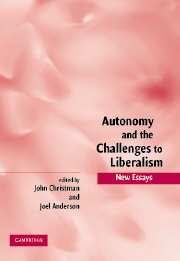Book contents
- Frontmatter
- Contents
- Contributors
- Preface
- Autonomy and the Challenges to Liberalism
- 1 Introduction
- PART I THE SELF: CONCEPTIONS OF THE AUTONOMOUS SELF
- PART II THE INTERPERSONAL: PERSONAL AUTHORITY AND INTERPERSONAL RECOGNITION
- PART III THE SOCIAL: PUBLIC POLICY AND LIBERAL PRINCIPLES
- 8 Autonomy, Domination, and the Republican Challenge to Liberalism
- 9 Liberal Autonomy and Consumer Sovereignty
- 10 Political Liberty: Integrating Five Conceptions of Autonomy
- PART IV THE POLITICAL: LIBERALISM, LEGITIMACY, AND PUBLIC REASON
- Bibliography
- Index
9 - Liberal Autonomy and Consumer Sovereignty
Published online by Cambridge University Press: 02 December 2009
- Frontmatter
- Contents
- Contributors
- Preface
- Autonomy and the Challenges to Liberalism
- 1 Introduction
- PART I THE SELF: CONCEPTIONS OF THE AUTONOMOUS SELF
- PART II THE INTERPERSONAL: PERSONAL AUTHORITY AND INTERPERSONAL RECOGNITION
- PART III THE SOCIAL: PUBLIC POLICY AND LIBERAL PRINCIPLES
- 8 Autonomy, Domination, and the Republican Challenge to Liberalism
- 9 Liberal Autonomy and Consumer Sovereignty
- 10 Political Liberty: Integrating Five Conceptions of Autonomy
- PART IV THE POLITICAL: LIBERALISM, LEGITIMACY, AND PUBLIC REASON
- Bibliography
- Index
Summary
There is obviously a very close affinity between the concept of citizen autonomy, which is identified with a liberal organization of the political sphere, and the concept of consumer sovereignty, which is used to justify certain sorts of free market arrangements in the economy. Depending upon whose stock is thought to be higher at any given time, politicians will appeal to economic metaphors in order to justify liberal political principles, just as business leaders will appeal to democratic imagery in order to justify economic freedom. Thus, citizens are often described as “consumers” or “clients,” browsing through the “marketplace of ideas,” deciding how to “spend” their votes. Similarly, consumers are said to “vote with their wallets,” and that the success of firms reflects the “popular will.” The very term “consumer sovereignty” borrows a concept from the political sphere in order to legitimate a certain sort of economic arrangement.
These parallels are not illegitimate. The doctrines of liberal autonomy and consumer sovereignty are usually grounded through appeal to very similar normative considerations. More specifically, the arguments that are given for the claim that the state should respect the autonomy of citizens are often identical to those made in favour of consumer sovereignty. If individuals are, by and large, the best judges of their own interests, then the society that leaves them free to pursue their own chosen plan of life will be superior to one that does not.
- Type
- Chapter
- Information
- Autonomy and the Challenges to LiberalismNew Essays, pp. 204 - 225Publisher: Cambridge University PressPrint publication year: 2005
- 8
- Cited by

